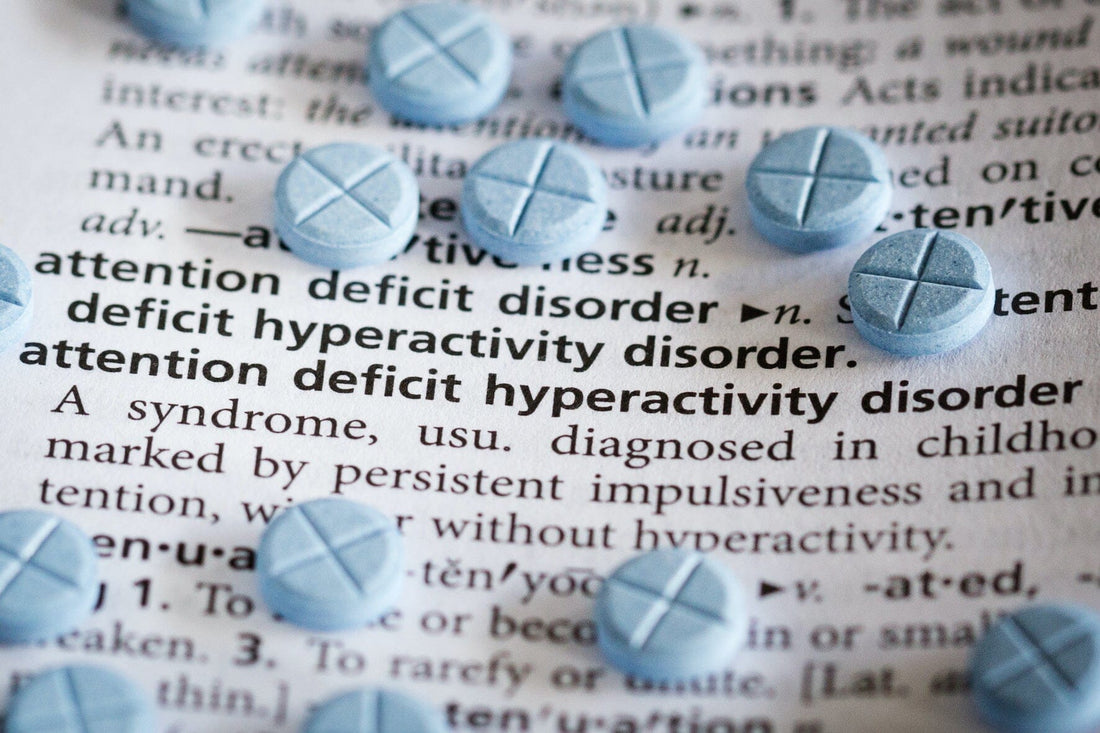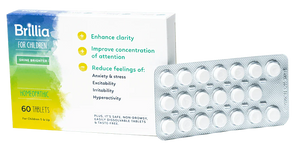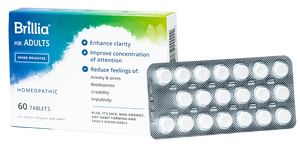When a child or adult has been diagnosed with attention deficit hyperactivity disorder, doctors typically prescribe stimulant ADHD medications that work by increasing the levels of certain brain chemicals like dopamine and norepinephrine. While these types of drugs can be helpful for many, they are associated with a range of side effects you should know about.
If your health care provider has prescribed ADHD medications for you or your child, reviewing these side effects can help you decide if your current medication is right for you.
Signs You May Need ADHD Medication
There is no “cure” for ADHD. There is no “magic pill” or medication that will make ADHD go away. They only help reduce some of the associated symptoms. At Brillia, we are proponents of a holistic approach. Some of the symptoms targeted by medication, such as inattention, hyperactivity, and restlessness, can be exacerbated by poor lifestyle habits like staying up too late, overusing screens, and eating too many processed foods. We suggest making healthy lifestyle changes first before exploring medication to see if your symptoms could be managed with simple behavioral strategies.
If lifestyle changes do not produce the results you want, you may want to incorporate medication into your routine. Stimulants are the most common ADHD medications for adults, but they are not the only option.
Types of ADHD Medication
There are two main types of prescription ADHD medications: stimulants and non-stimulants.
Stimulants are fast-acting drugs that target norepinephrine and dopamine to speed up brain activity and improve focus. These include drugs like Adderall, Ritalin, and Concerta.
Non-stimulants also target norepinephrine and dopamine, but work slower than stimulants. People often turn to non-stimulants if stimulants were found to be ineffective or if they have caused undesirable side effects. These drugs include Strattera, Kapvay, and Intuniv.
In some cases, doctors may prescribe antidepressants like Wellbutrin instead of or in addition to stimulants or non-stimulants. But the FDA has not approved antidepressants for this use.
Common Side Effects
From insomnia to anxiety and weight loss, there are a number of side effects associated with both stimulant and non-stimulant ADHD drugs. In some cases, these symptoms go away as your body adjusts to the medication, but for some they persist.
Sleep Problems
Sleep problems, such as difficulty falling asleep and overall shorter duration of sleep, are a common side effect associated with ADHD medications, especially stimulants. Since adequate sleep is an important factor in one's overall health, finding a solution to sleeping problems is a must. If this side effect doesn't improve within about a month of starting your prescription, your doctor may recommend that you switch to a shorter-acting dose or take the final dose earlier in the day.
Good sleep hygiene can also make a difference in sleep quantity and quality. For example, try one or more of the following:
- Try to go to bed at the same time every night
- Discontinue screen time at least an hour before bedtime
- Use herbal remedies or oils for relaxation
- Practice relaxation techniques before bed
- Take a bath before bed
Decreased Appetite
Decreased appetite affects about 80 percent of people who take stimulant medications.1 According to the Cleveland Clinic, this side effect is also common in non-stimulant drugs.2
With extended-release medications, an early dose before school or work often means a loss of appetite at lunchtime. When you first start taking these drugs, doctors recommend eating whenever you feel hungry and having snacks available when you feel the urge to eat. Opt for a healthy, hearty breakfast before the morning dose. However, it can be beneficial to inquire with your doctor about all options for you or your child, such as immediate release medication.It’s also important to note that some studies show that kids taking ADHD medications grow more slowly than average for the first 12 months.3 This is another reason why you may want to consider using these medications as a last resort when all other options have been exhausted.It is important to notify your doctor if you notice any severe weight loss or change in appetite with your child.
Headaches
Both kids and adults commonly have headaches, sometimes with nausea, when they start taking prescription ADHD medication. Usually, this side effect subsides in a few weeks. Your doctor may suggest taking each dose with food to reduce this side effect. Your doctor may also recommend an alternate schedule for taking the medication or a different medication altogether.
Moodiness
While most mood changes associated with ADHD drugs are subtle, some people may become aggressive, angry, manic, anxious or emotionally unresponsive. Kids may become cranky or irritable as the medication dose wears off. Doctors call this the rebound effect and it's important that you notify your doctor if this is occurring in case they decide to change the dose or the medication.
If you have bothersome symptoms after you begin taking a prescription medication for ADHD, your doctor may adjust the dosage or specific prescription. Try keeping a journal of the side effects experienced by you or your child so you can follow up with your healthcare provider. In addition to the above, other common side effects of ADHD prescription medications may include muscle tics, dizziness, stomach aches, dry mouth and nervousness.
Are There Long-Term Risks with Taking ADHD Medication?
The risk of experiencing long-term side effects from ADHD medication is low, but possible. These include delayed growth in children, sleep problems, weight loss, and tics.4 In one study, researchers found that those who took medication continued to experience improved symptoms of ADHD for up to three years after they stopped the treatment. But after that, there were no additional benefits. This makes the case for implementing healthy lifestyle habits alongside medication. The hope is that once you stop taking the medication, you can lean on the strategies you honed over time to help manage ADHD symptoms without medication.
Safe Alternatives to Help with ADHD
If you are in need of support but want to explore more gentle options before trying prescription medications, we suggest trying Brillia. As a non-prescription homeopathic medication, Brillia helps to reduce anxiety, irritability, hyperactivity, inattention, and impulsivity without harsh chemicals or harmful side effects.
Brillia’s active ingredient consists of antibodies to the brain-specific S100B protein, a crucial regulator in many different intracellular and extracellular brain processes. Studies have suggested that when the S100B protein is out of balance in the body, there is a disruption of these brain processes, resulting in increased irritability, anxiety, and stress.5 As Brillia helps to regulate the S100B protein, it also normalizes the level of monoamines (dopamine, norepinephrine, serotonin) in different parts of the brain, which are the same neurotransmitters targeted with prescription anti-medications. Brillia achieves this effect gently and impactfully without affecting any other systems in the body, masking the personality, or causing drowsiness, lethargy, or loss of appetite.
Brillia also differs from prescription ADHD drugs because your dosage does not need to be increased over time to produce the same effects. You can start or stop at any time without having to adjust to the medication or struggle with withdrawal symptoms. And if you are already taking a medication or supplement, Brillia can be added to your regimen without worry because there are no contraindications.
Are There Any Risks?
Clinical studies have proven that Brillia does not cause any harmful side effects or alter the blood chemistry in any way. Brillia is also free from artificial colors, artificial flavors, nuts, and gluten. However, the medication does contain lactose, which may be an issue for those who are sensitive to lactose enzymes. Lactose intolerance should not be confused with a milk or dairy allergy, but the severity depends on the degree of your sensitivity. You can always try Brillia to see if you experience any undesirable reactions, and if so, we offer a money back guarantee for first-time buyers. (*Some restrictions apply.)
Learn more about how Brillia works and explore more resources on managing ADHD symptoms at the Brillia(nce) Resource Center.
Get a whole bunch of support right in your inbox.







